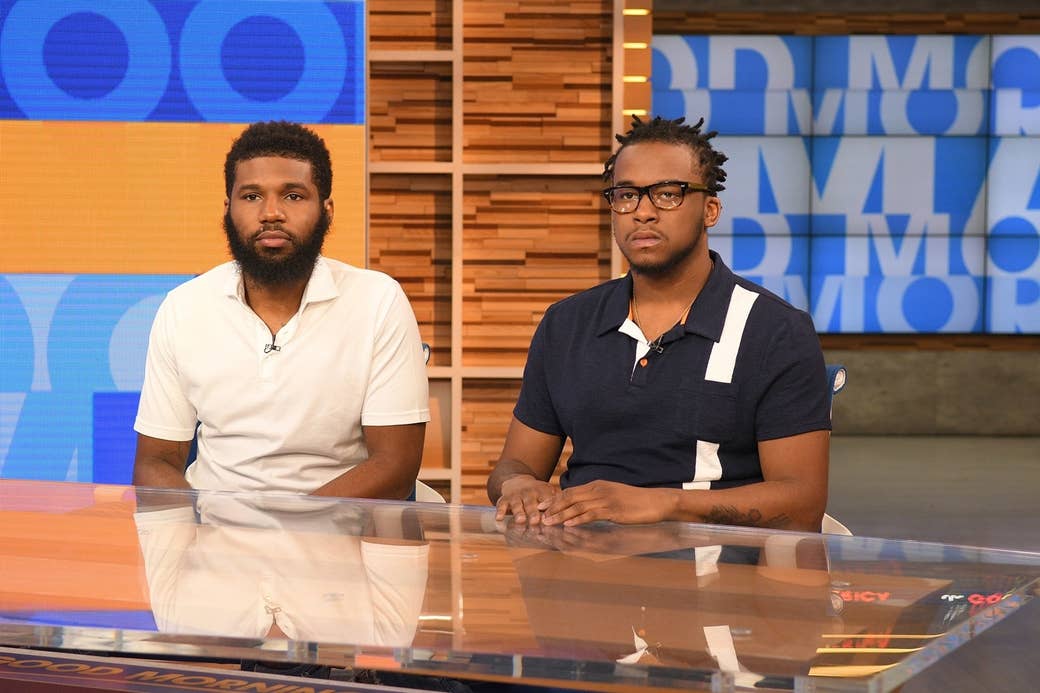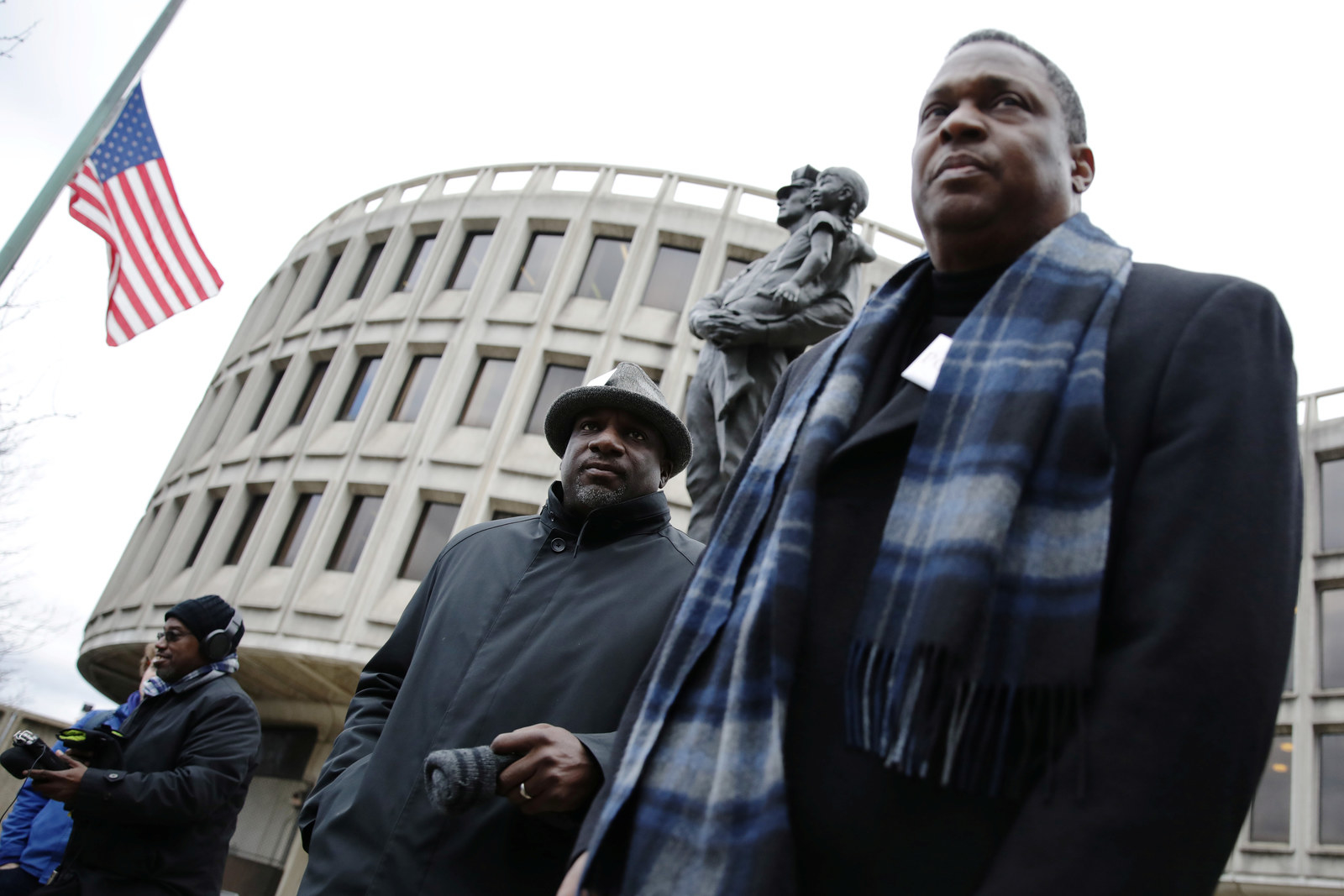
Some years back, I met this guy at a coffee shop for lunch. When he’d asked, the night before, which one we were meeting at, I was adamant about a particular location. And the next day, after I’d shown up a little early, for once, I ordered a drink, and found a table while they were making the drink, and out of the ether itself a young (white) guy appeared. He worked for the shop. He said seats were for paying customers only. I told him that I’d already ordered something, that I was waiting for someone, and the employee asked if that someone were purchasing a drink as well. When the guy I was meeting arrived, he ordered his own thing before he joined us, and even though the employee was ultimately placated, we ended up leaving anyway. The gag is, we were saddled with having to find another coffee shop.
When I relayed the story to some (black) friends later, they looked up at the end of it for a moment of silence. “That sucks,” said one. Another buddy agreed. Then the first asked what we were eating for lunch, and the second noted that it was too humid to go too far. We ended up moving on from the original conversation instantly, entirely: It was so commonplace, so boring, so expected, that it hardly warranted dwelling on.
Last week, Rashon Nelson and Donte Robinson were arrested at a Starbucks in downtown Philadelphia. Both men are black. Both men are 23. One man asked to use the restroom, only to be told that bathrooms were only for paying customers. When the two guys sat at a table to wait for an acquaintance — and given that Starbucks conceives of itself as a “third place,” a liaison between your home and your job, that is often the entity’s only functional purpose — a manager approached the men to ask if they wanted to order drinks. They declined, noting that they were waiting for a meeting. They’d brought water bottles. They’d be right out. Somewhere in the midst of this, two minutes after the men entered the premises, the police were called. And once the men saw the officers, Robinson later noted that his first thought was, “They can’t be here for us.”
Both men were cuffed. Neither was read his rights. They were arrested on suspicion of trespassing, and Starbucks ultimately declined to press charges.
When asked by Robin Roberts why the men were meeting in the first place, Robinson said, “It’s a real estate meeting. We’ve been working on this for months.”
What’s especially jarring, honestly, is that something so commonplace to black men — enough that many, if not most, of our regular routines simply accommodate the possibility of this sort of occurrence, the same way you might pack an umbrella or a jacket if you anticipated the remote chance of rain — is news to whole swathes of this country. As tidy as this would all be if it were a Starbucks issue, or a coffee shop issue, it is an empathy issue. So the question becomes one of occupation: Who is allowed to take up space in this country unassailed?
Whole cities and towns are only now, gradually, coming to terms with the world their neighbors have lived in for generations.
Trust is implicit to sharing a space. It requires a broad imagination. And these incidents are, above all, a failure of the imagination, as Claudia Rankine noted when she said that “blackness in the white imagination has nothing to do with black people.” But these transgressions also require a peculiar kind of magical thinking (in the same way that, in the present-day United States, the fictional hue of terrorism is an ambiguous brown, despite the reality being significantly paler).
It is, of course, within living memory that black people couldn’t even swim in city pools in this country (or that interracial marriage was illegal, or that schools segregated white and black students, or, or, or…). So there’s a grim familiarity to seeing two black guys enter a public space, only to be find themselves assailed for trespassing one hundred and twenty seconds later. It all happened so quickly that someone who entered the same Starbucks, at the same time, was probably still deciding what to order.
Maddeningly (and encouragingly, and distressingly), whole cities and towns are only now, gradually, coming to terms with the world their neighbors have lived in for generations. And more than one well-meaning white acquaintance has asked me why, if these moments are so mundane, one moment in one coffee shop has been magnified and blown up. But a thing about racism is that this same mundanity can quickly, irremediably alter the course of your life. Its boringness obfuscates that fact.
You knock on a door for directions, and you end up getting shot at. You pass through a convenience store for some Skittles, and you’re killed on your way back home. That Starbucks has taken it upon themselves to schedule an entire workday to “train” their employees on bias isn’t a bad thing — but if they can eradicate this in a single business day, then they should be outsourcing their course to police departments, universities, retailers, realty offices, restaurants, and maternity wards around the country.

The thing about bias — the thing about racism, about fear — is that it contorts itself to the moment and time.
So, briefly: Not very long ago, I was headed to a party, at a fancy spot in town, celebrating the anniversary of one bigwig literary entity or another. By the time I arrived (because I am late to everything), the other attendees were already toasting in the courtyard behind the building. So I sat in the foyer and waited, and that’s when two folks apparated out of nowhere to ask if I was attending. If I wasn’t (they didn’t give me time to answer), I’d have to leave. This was a private event. Hanging around was trespassing.
Except I wasn’t the only person milling around. And I was dressed like an attendee. And, at that actual moment, I literally heard my name called in the toast across the garden. But I was the only black guy in the room, in that mansion, at the time, and because the only thing more absurd to them than my presence would’ve been the idea that I was one of the individuals being praised, I thanked the women and told them that I’d leave and then I did.
And, the thing is, it could’ve been so much worse.
There’s a line in this poem by Morgan Parker that I glanced at once, last year, and have thought about every single day, several times a day, since then:
I do whatever I want because I could die any minute.
I haven’t walked into a cafe or a library or a gay bar or gotten pulled over or paused at a stoplight without mouthing it. Every time.
So you learn very quickly that it doesn’t matter if you set Knausgaard or The Bell Jar or the Times on your coffee table — you are black. You are Other. Which gives you a couple of options. Continue occupying these spaces, doing the things that you’re looking to do; or acquiesce to the incorrigible shadow of white supremacy (it’s always shifting). Anything in between would be interpreted as the former. But I’m not going to sit here and tell you which decision makes the most sense. The generous me opts for the first, but the sober me says whichever one won’t get you killed.
And it is always worth repeating that this is, for us, in many ways (always), a life or death situation. It happens just that quick.
There is a contingent of folks that will linger on how a handful of bystanders spoke up (During a coda in the moment, one man asks the room, “Does anybody else in this place think this is ridiculous?”). Some of these bystanders were white, which is cool. But, the thing is, that’s exactly what they should’ve done. It is exactly what you would hope someone would do for you in that situation. In fact, it’s what you’d expect, if you belonged to a particular demographic — and yet so much of being a minority in this country hinges on our not only expecting the worst, but preempting it, all while preparing alibis, footnotes, backups, and safeholds three times over. All of this, with the knowledge that shit still probably won’t work out.
But if it makes you feel better: Nice job. Keep up the good work.
In the Good Morning America interview with Roberts, when she asked what Nelson hoped would come from the moment, he asked for folks to take the opportunity as a stepping stone:
“This is something that has been going on for years,” said Nelson, “and everyone’s blind to it. But they know it’s going on, if you get what I mean.”
He finishes his statement by noting, “It’s not just a black people thing. It’s a people thing.” In Cristina Henríquez’s The Book of Unknown Americans, a narrator laments that sentiment’s permeability: “I walk into a store and the employees either ignore me or they’re hovering over every move I make because they think I’m going to steal something. I understand I might not look like much...I feel like telling them sometimes, You don’t know me, man! I’m a citizen here! But I shouldn’t have to tell anyone that. I want to be given the benefit of the doubt.”
So much of being a minority in this country hinges on our not only expecting the worst, but preempting it.
A daydream I have sometimes is that I’ll enter a store, make a purchase, and opt out of a bag. Or a cashier will ask how I want my receipt, and I’ll say, just email it! (That’s usually around the moment that I realize I’m unconscious.) Because that’s the thing. As Toni Morrison noted, “the very serious function of racism is distraction. It keeps you from doing your work. It keeps you explaining, over and over again, your reason for being.” But truly stopping the work, for us, in this country, is not an option — nor is it something we’ve ever had the luxury, or the desire, to do.
For what it’s worth, the coffee shop I go to by my apartment is the same one I’ve gone to for half a decade. I didn’t have any problems the first time I passed through — no purse-shifting, no foot tapping, no pursed lips, no hovering, no “Are you sure you’re in the right place?” Which was suspicious enough. But after a second visit, and then a third, and a fourth trip, I figured the spot was cool enough, and I’ve made it mine ever since.
But once, a few months back, after a stint away from Houston, I popped in for a midafternoon chai. The usual baristas weren’t around. This new guy, a white dude, stood in their place. I set my bag down before paying, the way I’d done for years, and plugged my chargers in by the window, the way I’d done for years, and this dude never stopped staring. Didn’t blink. There was a question on his face and I waited for it to come. Except it didn’t; he just smiled, and then I smiled too. But I doubt that it was for the same reason. ●
Bryan Washington is a writer from Houston. His first collection of stories, Lot, is forthcoming from Riverhead Books.
